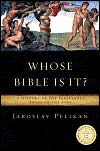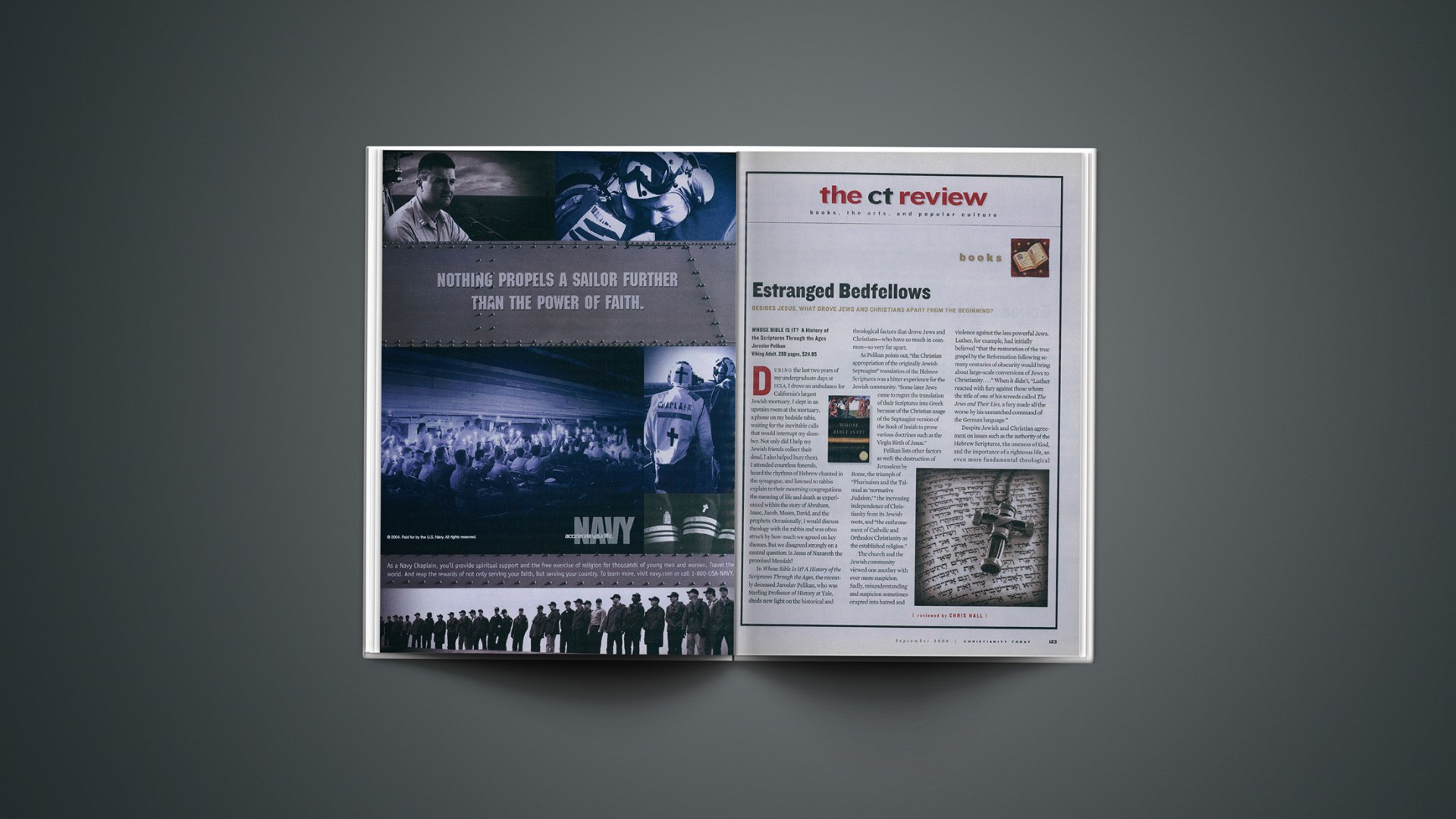During the last two years of my undergraduate days at UCLA, I drove an ambulance for California’s largest Jewish mortuary. I slept in an upstairs room at the mortuary, a phone on my bedside table, waiting for the inevitable calls that would interrupt my slumber. Not only did I help my Jewish friends collect their dead, I also helped bury them. I attended countless funerals, heard the rhythms of Hebrew chanted in the synagogue, and listened to rabbis explain to their mourning congregations the meaning of life and death as experienced within the story of Abraham, Isaac, Jacob, Moses, David, and the prophets. Occasionally, I would discuss theology with the rabbis and was often struck by how much we agreed on key themes. But we disagreed strongly on a central question: Is Jesus of Nazareth the promised Messiah?
 WHOSE BIBLE IS IT?A History ofthe Scriptures Throughthe Agesby Jaroslav PelikanViking Adult288 pp.; $24.95 |
In Whose Bible Is It? A History of the Scriptures Through the Ages, the recently deceased Jaroslav Pelikan, who was Sterling Professor of History at Yale, sheds new light on the historical and theological factors that drove Jews and Christians—who have so much in common—so very far apart.
As Pelikan points out, “the Christian appropriation of the originally Jewish Septuagint” translation of the Hebrew Scriptures was a bitter experience for the Jewish community. “Some later Jews came to regret the translation of their Scriptures into Greek because of the Christian usage of the Septuagint version of the Book of Isaiah to prove various doctrines such as the Virgin Birth of Jesus.”
Pelikan lists other factors as well: the destruction of Jerusalem by Rome, the triumph of “Pharisaism and the Talmud as ‘normative Judaism,'” the increasing independence of Christianity from its Jewish roots, and “the enthronement of Catholic and Orthodox Christianity as the established religion.”
The church and the Jewish community viewed one another with ever more suspicion. Sadly, misunderstanding and suspicion sometimes erupted into hatred and violence against the less powerful Jews. Luther, for example, had initially believed “that the restoration of the true gospel by the Reformation following so many centuries of obscurity would bring about large-scale conversions of Jews to Christianity. …” When it didn’t, “Luther reacted with fury against those whom the title of one of his screeds called The Jews and Their Lies, a fury made all the worse by his unmatched command of the German language.”
Despite Jewish and Christian agreement on issues such as the authority of the Hebrew Scriptures, the oneness of God, and the importance of a righteous life, an even more fundamental theological difference continues to cast a shadow over our best efforts at promoting interfaith relations: Do the Hebrew Scriptures bear genuine witness to Jesus of Nazareth as the long-awaited Messiah?
Mainstream Jewish and Christian commentary on Scripture has, Pelikan stresses, run largely on parallel tracks. Sometimes the tracks have approached one another closely. But on the question of the Messiah’s identity, the tracks diverge. Unfortunately, Pelikan fails to give proper weight to this key difference between most Jews and Christians, writing, “The more we understand that parallelism, the more profound are the affinities and the more tragic the mutual ignorance and misunderstanding.”
The key problem here is not ignorance or misunderstanding, but disagreement over the answer to Christ’s perennial question: “Who do you say that I am?”
Yet despite this disagreement, it is we who have been graciously invited by God to join Israel’s story. The better we understand our differences regarding the Christ, the more effective future communication between our two communities will be, two communities whose future is inextricably linked.
Chris Hall is provost of Eastern University and dean of the Templeton Honors College.
Copyright © 2006 Christianity Today. Click for reprint information.
Related Elsewhere:
Whose Bible Is It? is available from Christianbook.com and other book retailers.
More information is available from Viking Press.
Christianity Todayprofiled Jaroslav Pelikan in 1990 after his work on the history of doctrine.
The New York Times, NPR, and the Christian Science Monitor all reviewed the book.
For book lovers, our 2006 CT book awards are available online, along with our book awards for 2005, 2004, 2003, 2002, 2001, 2000, 1999, 1998, and 1997, as well as our Books of the Twentieth Century. For other coverage or reviews, see our Books archive and the weekly Books & Culture Corner.










